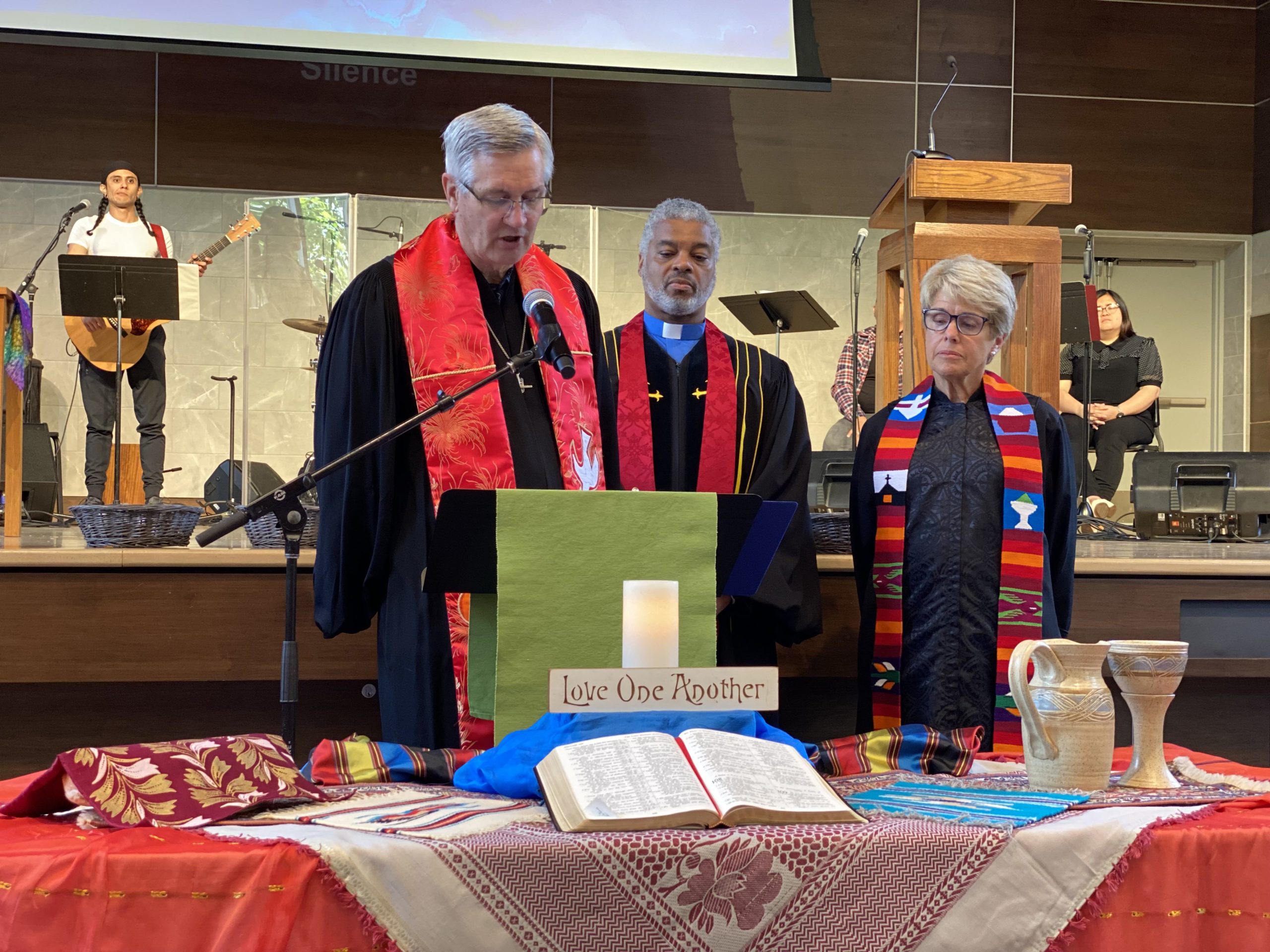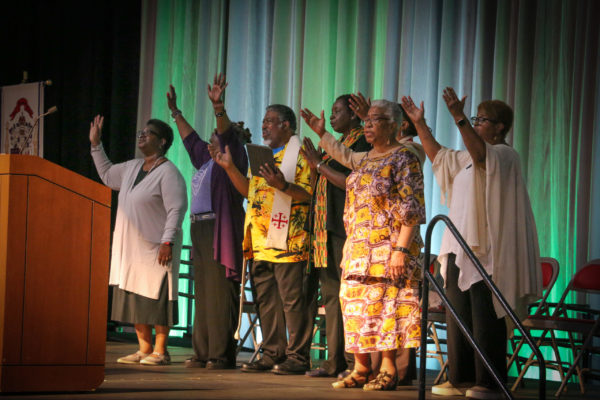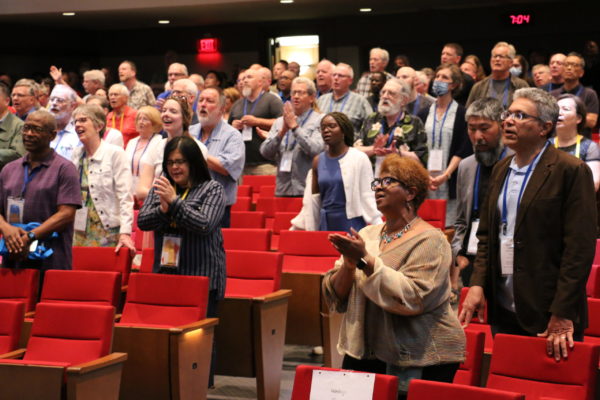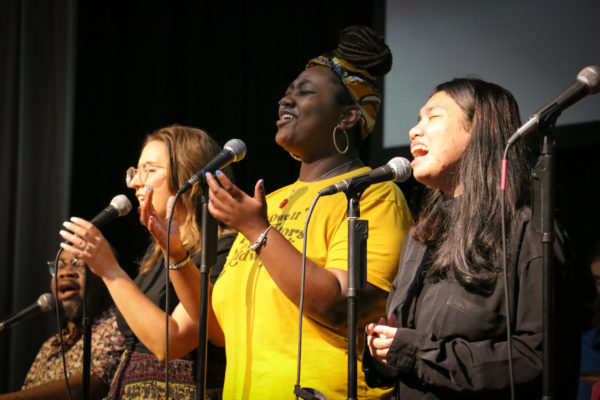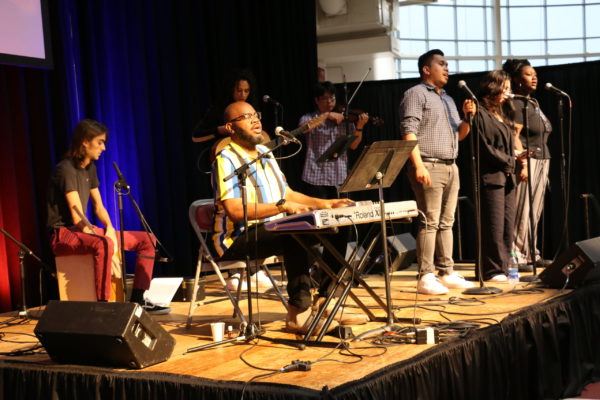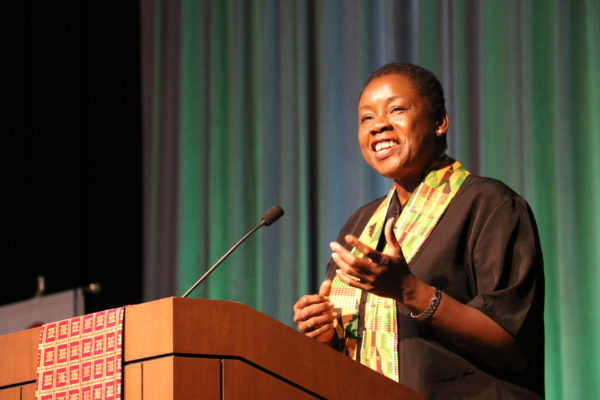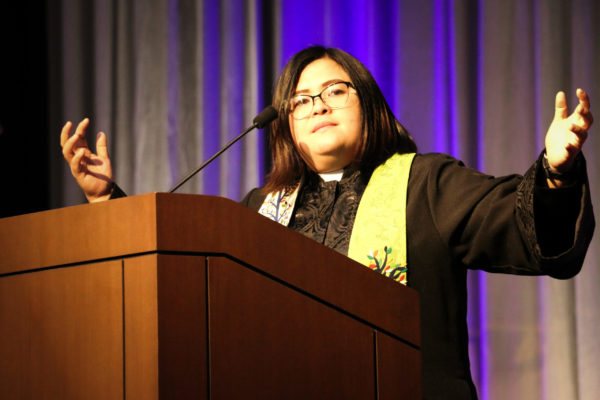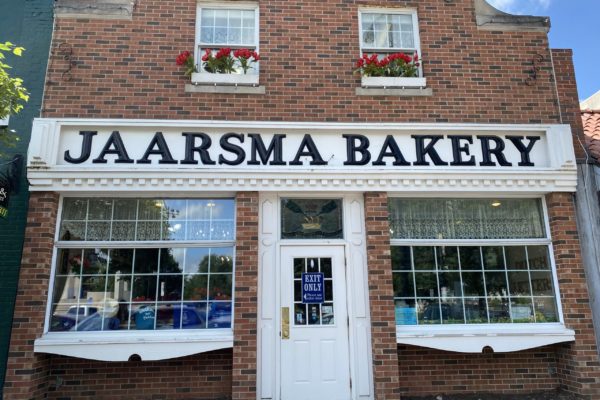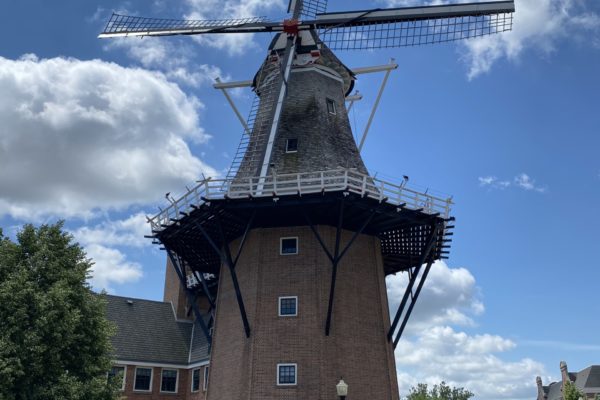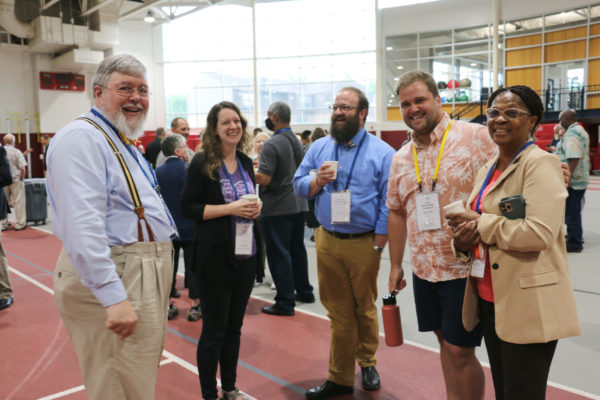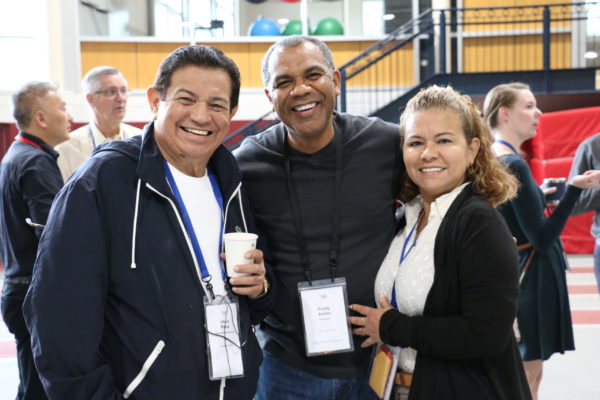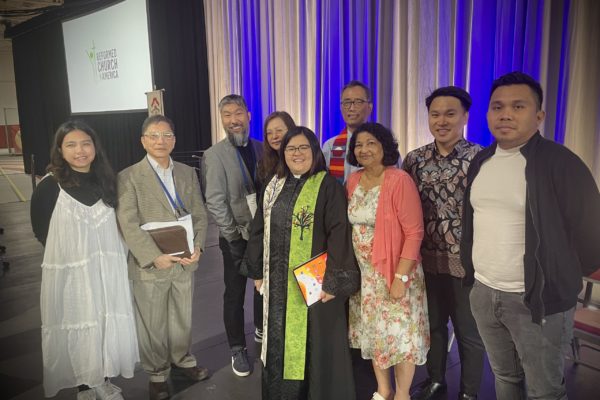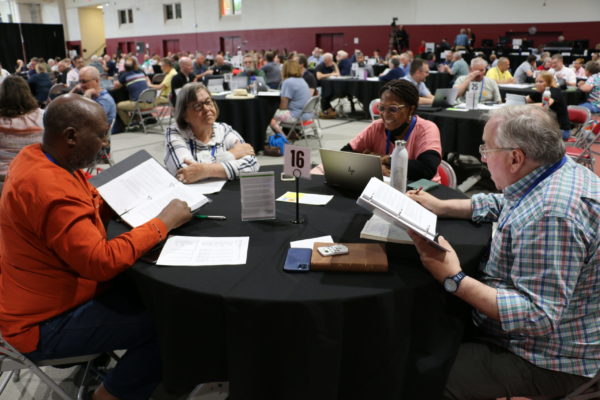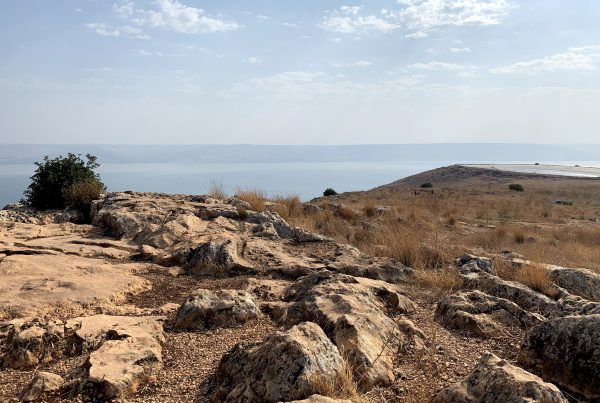Moving from lament into hope
Echoes of both lament and hope reverberated throughout General Synod 2022. There was lament for the loss of churches and colleagues who have departed the RCA, for the injustices and pain of marginalized communities and people near and far, and for the lasting impact of the COVID-19 pandemic.
Yet hope bubbled up just as often as lament in Pella. The message “God is not done with the RCA yet” rang clear in many conversations. And the Holy Spirit showed up as delegates worshiped, prayed, and discussed the work of the church together.
When general secretary Eddy Alemán addressed the General Synod Friday morning, appropriately, it was also with a message of lament and hope. These themes came through in Rev. Dr. Micah McCreary’s sermon at opening worship as well.
“That space between our cross and our resurrection is our sacred space,” McCreary said. “Freedom is found and obtained as we learn to trust that our emptying and our pausing will bear fruit.
“Our dream might be deferred, but while we are in the valley, we can find green pastures,” he continued. “As we spend time pausing, we find hope that our actions will change the world for the better.”
See how lament moved into hope at one RCA church:
Next General Synod leaders elected
Synod elected and installed Dwayne Jackson as the president of General Synod 2023. Judy Nelson was elected vice president of General Synod 2023. Jackson is the co-pastor of the Second Reformed Church of Hackensack in New Jersey. Nelson currently serves as a chaplain at Tyson Foods in Holland, Michigan.
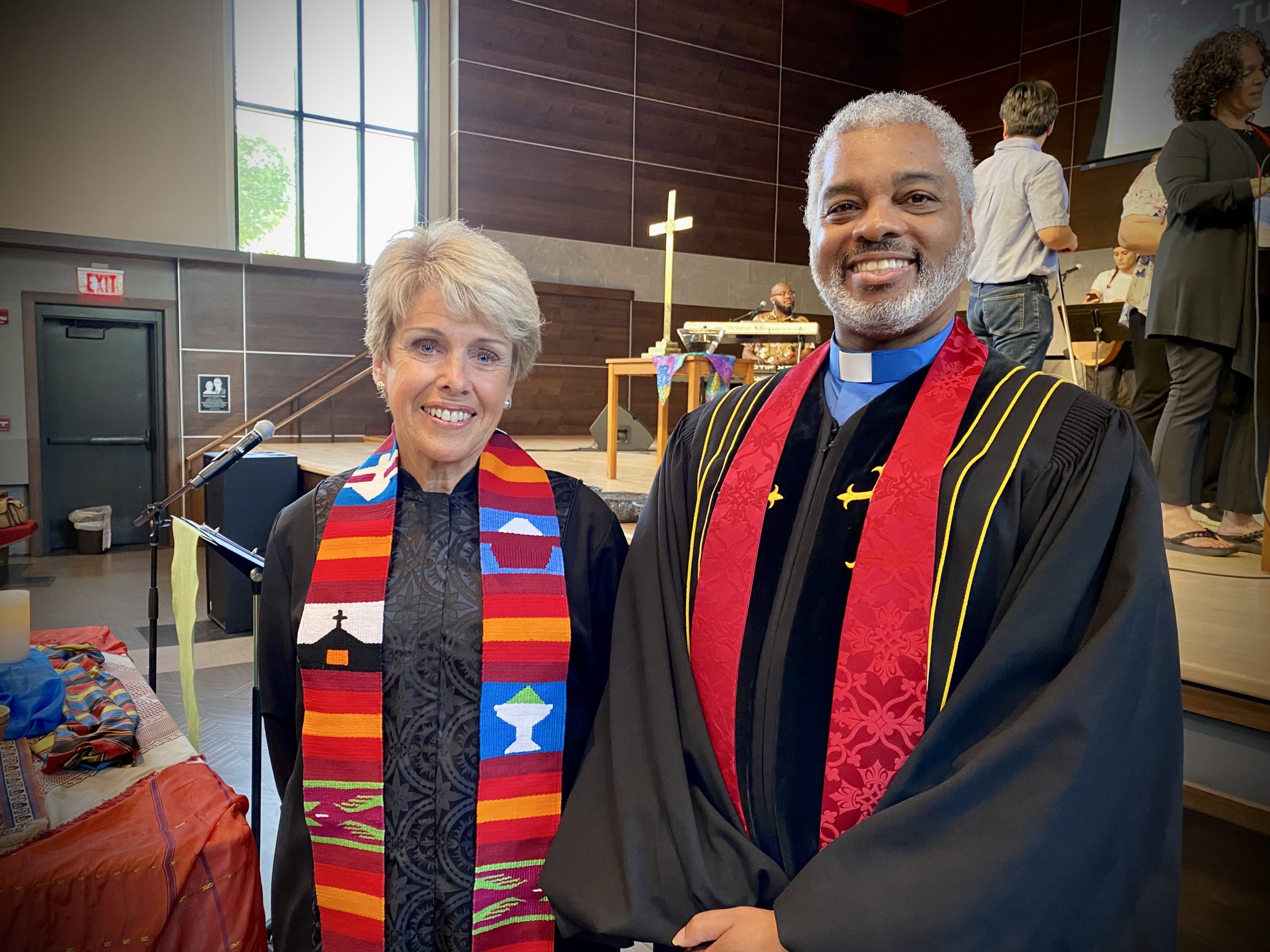
“You’re trusting me, and I’m trusting you in return,” Nelson said upon her election. “Let’s go forward. Let’s be the church of God. Let’s be the hands and feet of God in our homes, in our churches, in our workplaces, in our communities, and in our world. Let’s surprise the world, because God is at work in the Reformed Church in America.”
“Amid all the separations, and the falling aways, and the heartbreaks over the last year, I still see hope. I see joy. I see God hard at work in the Reformed Church in America,” Jackson said. “As I transition out of this chair and into that chair, I want you to pray with me, pray for me, walk with me, and let us breathe new life in the Reformed Church in America. And let the RCA be a model of how all churches should respond to God’s call.”
Jackson and Nelson were installed during General Synod closing worship and will serve over the coming year.
Western Theological Seminary will be “officially related” to RCA
On Saturday afternoon, General Synod deliberated over what many considered to be the biggest item of business before the body this year: changes to Western Theological Seminary’s bylaws making it an “officially related” institution of the denomination rather than a directly RCA seminary.
Delegates expressed concern over a decreased relationship between the denomination and the seminary, and asked for additional details about how the change would benefit the seminary. Western board president Steve Spoelhof and president Felix Theonugraha answered these concerns, pointing to a need for greater sustainability for the seminary, wanting to attract a wider pool of incoming students, and hoping to raise support from a broader group of donors.
“Let me be clear: we are not leaving the RCA. I believe that this decision will actually strengthen the RCA,” said Theonugraha. “I am full of hope, and I am hope-filled with anticipation to see how Western Theological Seminary can play an unmistakable and critical role in the revitalization of the Reformed Church in America as we continue to serve the RCA and God’s church around the world.”
The change means that Western will now be solely governed by its board, with a few specified limitations.
Synod deepens its commitment to antiracism
General Synod deepened its commitment to antiracism and moving toward a multicultural and multiracial future freed from racism. Delegates passed recommendations to:
- Urge all RCA entities to adopt an antiracism policy.
- Provide Sankofa journeys (immersive trips focused on looking back at the history of racism in order to move forward) and other experiences around healing racism, for the next three years. These will be funded by a $0.36/member assessment.
- Reinstate Native American and First Nations Ministries as a fourth racial/ethnic council. (Scroll down for more background on this council.)
- Embed antiracism values and practices in new church starts and regularly share progress and learnings from these efforts.
Nate Pyle delivered the report of the Commission on Race and Ethnicity, which originated the above recommendations. He prefaced them with an important message.
“I may be a product of the RCA, but the future of the RCA does not look like me. The future of the RCA is multiracial and multiethnic,” said Pyle. “And that is a good thing. … It’s exciting because our denomination is increasingly looking like the kingdom of God.”
At the same time, Pyle spoke honestly about the challenges that stand in the way. He specifically addressed those who, like him, share the RCA’s white, Dutch roots.
“A multicultural future freed from racism sounds great in a vision statement, but living that vision out is much harder,” Pyle said. “Our identities have been wrapped up in this Dutch Reformed faith community. It’s not that we don’t want to share what we love. It’s that in sharing it, we don’t want to lose it. If, in trying to avoid that loss, we hold onto power, resist change, and marginalize people who don’t look like us, or act like us, … we can unintentionally hold onto racist structures and institutions.
“How might some of us need to face the grief that we feel that our denomination isn’t going to be what it was?” Pyle wondered. “This is the work that we need to do if we’re truly going to be a denomination that is freed from racism.”
Some history of the Native American/First Nations Council
An American Indian Council was formed in 1972; later, the council decided to transition away from an advocacy ministry to a leadership development program in the form of an annual retreat, at which time it stopped meeting as a council. Funding for the council was repurposed for annual leadership retreats, which continue. General Synod Minutes from 2003 provide insights into the transition; the Minutes from 2010 include an update from a Task Force to Restore the Voices of Native American/First Nations Congregations and Ministries. Taking the Jesus Road, a book in the RCA Historical Series, shares the history of RCA ministry among Native Americans; Called to Serve: Essays on RCA Global Mission also includes a chapter on the history of Native American churches in the RCA.
Synod calls to suspend Russian Orthodox Church from WCC for Ukraine war support
Late Monday afternoon, synod voted overwhelmingly in favor of taking steps to call for the Russian Orthodox Church’s suspension from the World Council of Churches (WCC) because of its support for Russia’s war on Ukraine.
Additionally, delegates ordered an examination of whether the church’s actions meet the criteria for status confessionis. Status confessionis, a full break in communion, has been invoked twice before: toward churches in apartheid South Africa and Nazi Germany. The Commission on Theology, in consultation with the General Synod professorate, will examine whether the war meets the criteria, with report to synod in 2023.
Synod delegates contributed to RCA Global Mission’s Ukrainian refugee support efforts through the General Synod offering, collecting $6,965.41. An additional designation of international church planting raised an additional $5,105.41. The offerings totaled $12,070.82, including a $5,000 match from a donor.
Worship at synod
An update on the Restructuring Team’s work
Four members of the Restructuring Team, whose formation was approved at General Synod 2021, provided an introduction and update to their work: considering sustainable restructuring options for the denomination moving forward. Thus far, the team has met once via Zoom and once in-person. It has committed to a Holy Spirit–led discernment process as it begins this significant work, with a final report to General Synod 2024. At this year’s synod, delegates voted to request that the team add a “foundational report” to come to General Synod 2023, “for the purpose of lessening the sense of uncertainty and to build upon the vision going forward.”
The team also led a spiritual discernment exercise for the General Synod, with recommendation for engaging the following resources as the denomination joins the team in this discernment process:
- Pursuing God’s Will Together by Ruth Haley Barton. The team is using this book to guide its work of discernment and invites the denomination to read this book, too.
- Listening prayer guide by Jim Harrison
- Prayer of transformation
Synod approves changes to certification for ministry process
On Monday morning, General Synod 2022 discussed changes to the way candidates for ministry pursue ordination. They approved recommendations to rename the Certificate of Fitness for Ministry the “Certificate of Readiness for Examination” and adjust the process for granting certificates.
The proposed changes aim to clarify the certificate’s role in the ordination process and the requirements for being granted a certificate. They also affirm that examination for ordination and licensure is a classis responsibility.
Because these recommendations would amend the Book of Church Order, they will now go before the classes for consideration.
Picturesque Pella
Other business
- General Synod affirmed the importance of the RCA Archives. Delegates approved exploration of establishing a historic trust to sustain and secure the work of the archives. They also considered a recommendation to place the archives staff under the supervision of a subcommittee of the Commission on History. This was referred to the Commission on Church Order, in consultation with the Commission on History.
- Synod affirmed the worth of all people, “regardless of sexuality or gender, as beloved, shared image-bearers of God,” and lamented how the RCA and the wider church has harmed LGBTQ+ people, “whom we embrace as children of God who are welcome in the RCA.”
- Through recommendations from the Commission on Christian Action, General Synod responded to current social issues. Delegates urged congregations to seek education and resources around the opioid crisis and to take action against food injustice. The synod approved the creation of a contributions-based fund for grants to congregations to make improvements toward accessibility.
- General Synod unanimously approved sustaining the $6,900 Partnership-In-Mission (PIM) share amount for 2023. PIM shares fund the work of RCA Global Mission and missionaries.
- Delegates approved a total per-member assessment of $55.58 for 2023 (a $1 per-member increase for 2023 to help offset rising costs due to inflation). Synod also approved a 36-cent assessment increase to provide Sankofa journeys (immersive trips focused on looking back at the history of racism in order to move forward) and other experiences around healing racism, for the next three years.
- Covenant Shares will go into effect in 2024, since the synod voted not to delay implementation for another year.
- General Synod celebrated two churches that officially organized since last October, as well as the start of five new church plants. Many new global church planting partnerships are in progress and on the horizon.
- General Synod celebrated the work of RCA Global Mission. Delegates heard video messages from missionaries throughout the week. Watch the missionary videos and hear how God is at work.
Fellowship at synod
Tools and resources for ministry
Santo, Santo, Santo/Holy, Holy, Holy: A Bilingual Hymnal
The Commission for Christian Worship recommended this hymnal as “an excellent resource for RCA congregations who are answering the call to integrate Spanish- and English-speaking peoples together in worship.”
Gluten-free communion guidelines
Synod approved guidelines for administering gluten-free Communion from the Commission on Christian Worship. Worship services during synod were fully gluten-free.
The Opioid Epidemic Practical Toolkit
Synod commended this toolkit from the U.S. Department of Health and Human Services for faith communities to respond to the opioid crisis.
Blest Be the Tie that Binds: the theology of affinity
The Commission on Theology brought before the synod a paper delving into how affinity classes and synods align with Reformed theology. The paper was commended as “a resource for congregations, classes, regional synods, and the Restructuring Team for discussion on what it means to be part of the RCA.”


